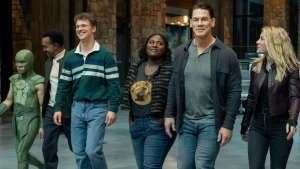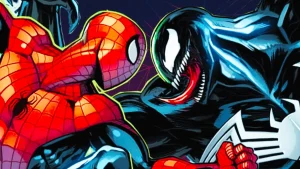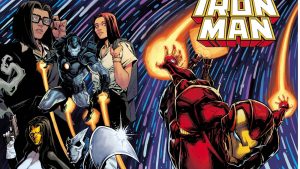The ’90s anime boom was both a golden age and a beautiful mess. This era gave us psychological deconstructions like Evangelion, genre-defying masterpieces like Cowboy Bebop, and battle epics like Rurouni Kenshin, all while studios navigated the transition from cel animation to digital production with varying degrees of success.
Yet for all its revolutionary storytelling, ’90s anime frequently sabotaged itself with problematic elements that feel increasingly jarring to contemporary viewers. The era’s casual sexism manifested in gratuitous fan service that undermined otherwise complex female characters, while harmful stereotypes and outdated cultural depictions went largely unchallenged. Production-wise, the industry’s most frustrating habit was the “anime original ending”— the practice of creating rushed conclusions when adaptations caught up to ongoing manga. Despite these flaws, the ’90s laid the groundwork for modern anime, but a rebooting of many of these classics would give them the polish, representation, and pacing they always deserved. Great ideas shouldn’t be held back by the limitations of their time.
Revolutionary Girl Utena is a coming-of-age fairy tale put through a blender of surrealism and gender subversion. The story is about Utena Tenjou, a girl who wants to be a prince rather than the stereotypical princess. She ends up at a surreal academy where sword duels determine who gets to possess the Rose Bride, who supposedly grants the victor power to “revolutionize the world.”
Utena is very much a product of its time and crew — its rough edges and ’90s TV cadence are part of its charm. Director Ikuhara was previously known for directing Sailor Moon, and you can see how Utena both builds upon and subverts the magical girl genre he helped define. A straight remake risks sanding off the provocation that makes it hit. That said, there’s room for a reinterpretation. A new take could engage contemporary conversations on gender and queerness with today’s vocabulary.
Outlaw Star is a late-’90s space western about Gene Starwind, a jack-of-all-trades who stumbles into captaincy of a ship, the Outlaw Star, and gets swept into a treasure hunt for a mythic nexus that might grant ultimate power. It’s got that adventurous, anything-is-possible energy, like a mashup of Cowboy Bebop and Firefly, but with its own quirky charm.
While it’s aged better than you’d expect, the concept of giant spaceship fistfights is still one of the coolest things ever, and it deserves to be seen in high-definition glory. The 26-episode format ultimately constrained its ability to fully explore this expansive world. A reboot could also tighten up the pacing and expand on some of the lore, like the mysterious Galactic Leyline or the backstories of side characters like Suzuka and Aisha.
Great Teacher Onizuka (GTO) is a comedy-drama about Eikichi Onizuka, a 22-year-old ex-biker gang leader who decides to become the “greatest teacher.” Onizuka quickly evolves into one of the most unconventional and inspiring teachers you’ve ever seen. He’s crass, immature, and completely unqualified, but he’s also fiercely loyal, empathetic, and willing to go to hilarious extremes to help his students.
The 1999-2000 anime adaptation of Great Teacher Onizuka ran for 43 episodes but only adapted roughly half of the manga’s content. GTO has had multiple manga sequels/spin-offs (GTO: Shonan 14 Days, Paradise Lost), several live-action adaptations, and enduring name recognition. But none have been the definitive modern take. Onizuka deserves a chance to educate and entertain a new generation.
The Vision of Escaflowne is a 1996 fantasia that mashes together isekai romance and mecha duels. The story follows Hitomi Kanzaki, a high school girl who is suddenly transported to the world of Gaea, where Earth is visible in the sky like a second moon. There, she becomes entangled in the fate of Van Fanel, who pilots a legendary mecha known as Escaflowne. Together, they fight against the Zaibach Empire, which seeks to alter fate itself through the reality-manipulating technology.
Originally conceived as a 39-episode series, director Kazuki Akane had to compress their planned storyline into just 26 episodes due to budget issues. The shortened episode count led to a compressed final act that rushed certain storylines and character developments. A reboot could finally realize the complete vision, giving proper time to elements like the relationship between Hitomi and her potential romantic interests, Van’s development as a ruler, and the complex political landscape of Gaea.
Yu Yu Hakusho deserves a reboot not because it “failed” the first time — it didn’t — but because the material’s strengths outstrip the constraints of its era. The shonen series by Yoshihiro Togashi follows a delinquent protagonist, Yusuke Urameshi, who dies and is offered a second chance as a “Spirit Detective.” From there, it evolves from episodic supernatural cases into a tight tournament-and-invasion saga that fuses street brawling grit with mythic stakes. The 1992–1995 anime is unevenly paced and production-wobbly outside of highlight episodes.
Even fans admit off-model art, recycled cuts, and abrupt transitions, especially post–Dark Tournament. An interesting fact often overlooked is that creator Yoshihiro Togash ended the manga earlier than planned due to health issues and the tremendous pressure of weekly publication deadlines. This resulted in a somewhat rushed Three Kings arc that condensed what could have been a much longer and more developed final saga. A reboot would have the opportunity to expand this final arc to its full potential.
What do you think? Leave a comment below and join the conversation now in the ComicBook Forum!
The post 5 ’90s Anime Series That Absolutely Deserve Modern Reboots appeared first on ComicBook.com.




